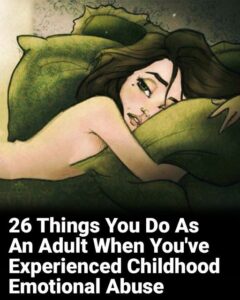26 Things You Do as an Adult When You’ve Experienced Childhood Emotional Abuse
Childhood emotional abuse leaves deep scars that can influence a person’s behaviors and emotional well-being well into adulthood. Often, the patterns created during those formative years are subtle yet pervasive, manifesting in habits, relationships, and how you perceive yourself and the world. Here are 26 things adults might experience or do as a result of childhood emotional abuse:
1. Struggle with Self-Worth
Constant criticism or neglect during childhood leads to feelings of inadequacy, making it hard to see your own value.
2. People-Pleasing
You may prioritize others’ needs over your own, fearing rejection or conflict if you say “no.”
3. Difficulty Setting Boundaries
Emotional abuse often teaches you to suppress your needs, making boundaries seem selfish or unattainable.
4. Fear of Conflict
You might avoid disagreements at all costs, associating them with emotional harm.
5. Hypervigilance
A childhood filled with unpredictable behavior can make you constantly on guard, analyzing every situation for potential threats.
6. Overthinking
You may replay conversations and scenarios, doubting yourself and trying to ensure you didn’t do anything “wrong.”
7. Difficulty Trusting Others
Betrayals of trust in childhood create fear of being vulnerable or relying on others.
8. Constant Apologizing
You might apologize excessively, even for things beyond your control, as a reflex to avoid blame.
9. Low Emotional Awareness
Since your feelings were likely dismissed or invalidated, you may struggle to identify or express your emotions.
10. Overachieving
Seeking external validation becomes a way to prove your worth and compensate for feelings of inadequacy.
11. Self-Sabotage
Fear of success or happiness may lead you to unconsciously undermine your progress.
12. Attraction to Toxic Relationships
What feels familiar can often feel “comfortable,” even if it’s unhealthy.
13. Fear of Abandonment
Childhood emotional neglect can lead to clingy behaviors or difficulty letting people go.
14. Difficulty Accepting Love
You might question whether you deserve affection, dismissing it as insincere or temporary.
15. Overreacting to Criticism
Even constructive feedback can feel like a personal attack due to childhood conditioning.
16. Seeking Approval
You may rely heavily on others’ opinions to feel validated, unsure of your own judgment.
17. Avoiding Intimacy
Letting others in feels risky, as vulnerability was met with pain or rejection in the past.
18. Tendency to Isolate
You may retreat from others to avoid potential hurt or judgment.
19. Impostor Syndrome
Feelings of being a fraud often stem from internalized self-doubt.
20. Perfectionism
Trying to be “perfect” becomes a way to avoid criticism or rejection.
21. Struggles with Self-Care
You might feel guilty prioritizing your needs, as you were conditioned to believe they don’t matter.
22. Emotional Numbness
Suppressing emotions in childhood can lead to difficulty feeling or processing them as an adult.
23. Overattachment to “Things”
Objects can feel safer and more reliable than people, becoming sources of comfort.
24. Seeking Control
Growing up in an unpredictable environment can lead to a need to control everything around you.
25. Feeling Unseen
A lingering sense of invisibility from childhood can leave you yearning for acknowledgment and understanding.
26. Chronic Anxiety or Depression
The emotional weight of past abuse can manifest as ongoing mental health struggles.
Healing Is Possible
Recognizing these patterns is a powerful first step toward healing. Therapy, self-compassion, and supportive relationships can help break the cycle of emotional pain and foster personal growth. You’re not alone, and with time and effort, it’s possible to reclaim your sense of self and well-being.

